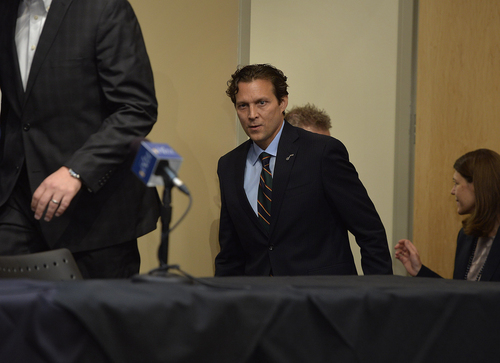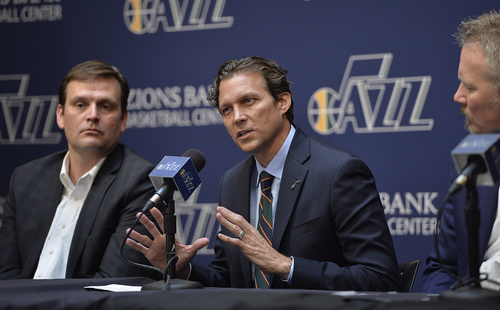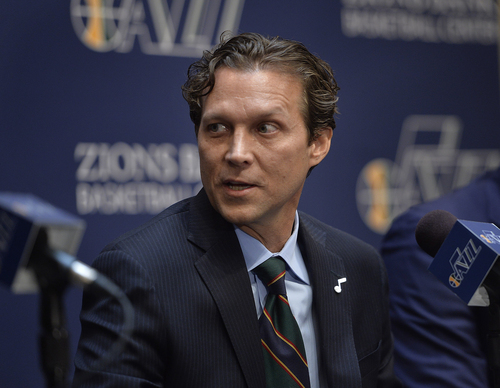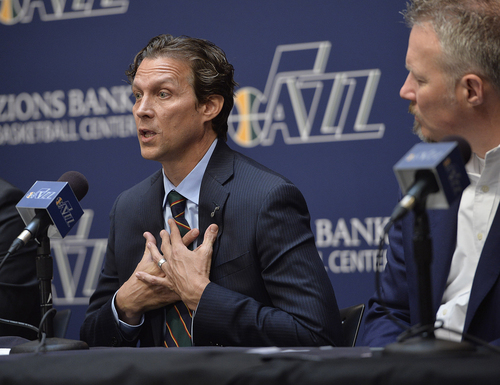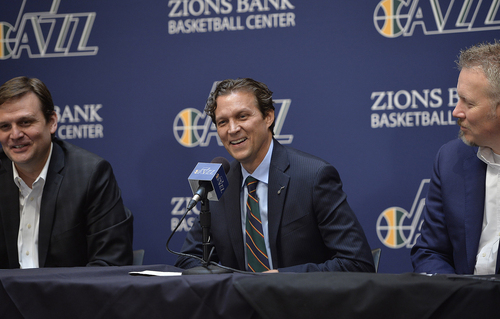This is an archived article that was published on sltrib.com in 2014, and information in the article may be outdated. It is provided only for personal research purposes and may not be reprinted.
There was a time when things came too easy for Quin Price Snyder.
His life was charmed. His game was a breeze.
The Spalding bounced his way.
Then, all of a sudden, it didn't. And chasing down the carom led him to the Utah Jazz.
"The challenges I've had, the adversity, make you better," he said.
Snyder grew up in Mercer Island, Wash., the same affluent community where Paul Allen now has a mansion or two or three and Bill Russell has a home, where Mercedes and Porsches roll through the streets and — who knows? — gumdrops and peanut butter cups grow on trees. Back then, Snyder was his state's two-time prep player of the year, a McDonald's All-American playing on the No. 1-ranked team in the country, winning championships for Mercer Island High School.
It got even sweeter.
He played at Duke. That short sentence, for some, is enough to brand Snyder forever, and not necessarily for the better. Coach Mike Krzyzewski, said during a news conference that he recruited Snyder because his wife made him. Not only was Snyder a gifted player, he had the flowing mane, the boyish good looks, and a whole lot of intelligence. He became a starting point guard in his second season and his team played in three Final Fours. After graduation, he coached as an assistant for the L.A. Clippers. He then returned to coach at Duke, and during that time earned a law degree and an MBA at the school, on top of his undergrad degrees in philosophy and political science.
Who does that? Only those kissed on the lips by the Fates. Sometimes, though, the Fates punch you in the mouth, too.
He rose quickly through the coaching ranks, prospering at Duke, then, at the age of 32, getting the head coaching job at Missouri, over two other candidates — John Calipari and Bill Self.
He won early at Missouri, and with his persona, his style, his brains, his energy, Snyder might as well have been fronting a rock band. He was toasted as the next big thing in college coaching — and then he was toast.
Life suddenly turned on him, dropped him on his head.
Things no longer came easy.
There were rumors about personal problems. There were NCAA violations, indiscretions in the Tiger program that Snyder may have outlasted had he been winning more. But, by then, his competitive success dried up. His teams stumbled and, ultimately, failed to meet expectations.
He resigned. Or he was fired.
Either way, Snyder's charmed existence spiraled downward.
He thought about getting out of the game, maybe utilizing all his education in other realms. But next thing, something five full-court passes from his past happened: He slipped into basketball's backwater.
And did so willingly.
Snyder caught on as the head coach of an outfit called the Austin Toros, an NBADL team nobody in the Texas capital city knew of or cared about. The Toros were so far removed from the big time, the team's coach became darn-near invisible. Having made millions of dollars at Missouri, his salary in Austin was $75,000 per. His players, a bunch of desperados whose hoop dreams had faded, said the Toros registered a zero on the sports scene there.
But that's where Quin Snyder gathered himself — and grew up.
The slick salesman with all that hair and that smug Doookie look turned into a grunt.
"I realized I got something I love to do," he said. "To work hard, to learn, and I've had a lot of people who helped me do that."
Snyder's wife, Amy, said that's when her husband rediscovered his passion for the game, even as it roughed him up.
And what he did next set the foundation for his coming to Utah.
He coached the daylights out of that Toro team, affiliated with the San Antonio Spurs, from 2007 to 2010, getting to know a Spurs personnel guy named Dennis Lindsey, before re-emerging as a player-development coach for the Philadelphia 76ers. Then, he became an assistant with the Lakers. Then, he joined Ettore Messina, as an assistant at CSKA Moscow. Then, he was a lead assistant coach at Atlanta, helping improve players who needed improvement.
On Saturday, he was introduced as the Jazz's new head coach.
Snyder, now 47, appeared thrilled to have found his new place, his first job as a head coach in the NBA. And the Jazz seemed thrilled to have him.
"The opportunity to join the Utah Jazz and to be a part of such a highly respected franchise with an incredibly bright future is a great honor," he said. "I approach this opportunity with gratitude and humility and am committed to doing everything I can to help the Jazz become a championship-caliber team."
Said Lindsey: "We're glad to have him."
If the circuitous route to this place and that position, after a quick start, has worked its wonders on Snyder, if it has taught him significant lessons about how to succeed, it must have rounded the sharp edges out of his demeanor. Add diligence and humility and gratitude to his brainpower — they don't just recklessly dispense law degrees and MBAs at Duke — and Snyder might now be ready to lead the Jazz the way — and to the place — Lindsey intends him to lead them.
On his extended sojourn, Snyder worked with, among others, Krzyzewski, Larry Brown, Gregg Popovich, R.C. Buford, Doug Collins, Messina, Mike Brown and Mike Budenholzer. That's a strong group of tough basketball men who Lindsey probed about his new hire ahead of hiring him.
Lindsey liked what he heard.
And so, a story of redemption comes into play: Snyder, the golden child, who won and won and won, then lost, then fell hard, then scratched and clawed and labored his way from basketball's backwater to its bright lights, has another chance to make a real difference, this time with the Jazz.
There will be nothing easy about the job at hand. The Jazz won 25 games last season. Defense was little more than a whispered suggestion. Losing night after night hammered the young club.
That's real life.
Good thing the Jazz's new guy knows how to work and plod and fight, even, especially, when the Spalding doesn't bounce his way.
Gordon Monson hosts "The Big Show" with Spence Checketts weekdays from 3-7 p.m. on 97.5 FM/1280 and 960 AM The Zone. Twitter: @GordonMonson.


